Ken Ramirez is ready for his next stop – North Salem High School.
He’s traded in his motorcycle for a rental car this week, so he could take a few kids to school this morning.
“It’s better that they’re 20 minutes late than they don’t come at all,” Ramirez said.

Ken Ramirez walks with Humble, a senior, at North Salem High School in Salem, Ore., Tuesday, Sept. 17, 2019. Community resource specialists like Ramirez help student groups achieve academic success with one-on-one support.
Elizabeth Miller / OPB
As a community resource specialist for Salem-Keizer’s Pacific Islander students, he works outside the classroom so they’ll do better inside of it. The first few weeks of school are busy. He makes sure students are enrolled in required classes, that they have bus passes to get to those classes, and he finds resources for homeless students and their families.
Ramirez and Dwight Roberson, who does a similar job for Salem’s black students, are in their second year in their roles at the district. The work appears to be paying off. The data isn’t finalized yet, but unofficial graduation numbers from last spring show a 16% improvement for Pacific Islander students and a 28% increase for black students over the year before. The efforts involve a pretty small student group, but the impact on students is significant.
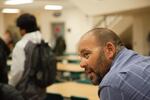
Ken Ramirez talks to students in the cafeteria at McKay High School in Salem, Ore., Tuesday, Sept. 17, 2019. Community resource specialists like Ramirez help student groups achieve academic success with one-on-one support.
Elizabeth Miller / OPB
“I'm honestly not doing anything special,” Ramirez said. “I hate to say that, there's no science around what I'm doing. It’s just trust and building a relationship and giving them the time, and [saying I] will always be dependable for them. Someone they can count on.”
For both Ramirez and Roberson, work often starts the night before. Ramirez said that’s when he starts receiving messages from students who need his help the following day.
“My phone has been going off all night,” Ramirez described. “I’ll just kind of go through the messages as they come in and see if they’re emergencies or if a kid is just asking something, or they’re up a little too late.”
And both men work all the time – weekends, nights, and sometimes after students have graduated.
“If it’s funerals, if it’s helping take a family member to a doctor appointment, those kinds of things, I’m going to be there to support them,” Ramirez said.
Students know Roberson and Ramirez are adults, but they’re different from teachers. Their job is to help, listen, and possibly talk to teachers if students don’t feel comfortable doing it themselves.

A student walks down an empty hallway at North Salem High School in Salem, Ore., Tuesday, Sept. 17, 2019.
Elizabeth Miller / OPB
They also make a home visit if students don’t show up at school.
“He’s always calling us, any time of day,” said North Salem High School senior, Dale. “Always checking up, he’s literally always on our butts.”
At the beginning of last year, Dale had four credits out of the 24 required to graduate. Ramirez helped him get work and the core classes he needs.
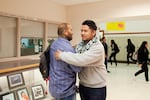
Ken Ramirez greets Dale, a senior, at North Salem High School in Salem, Ore., Tuesday, Sept. 17, 2019. Community resource specialists like Ramirez help student groups achieve academic success with one-on-one support.
Elizabeth Miller / OPB
“I was just surprised cause not a lot of people expect teachers to help you like that,” Dale said.
The benefit of outreach workers is not widely studied. But Ramirez and Roberson are both people of color, and there is research into how students respond when school staff is more diverse.
Desiree Carver-Thomas, a researcher at the Learning Policy Institute, has looked into the potential benefits of having teachers of color.
“When students of color have teachers of color, in addition, both students of color and white students report having positive perceptions of their teachers of color, including feeling cared for and academically challenged,” Carver-Thomas said.
Beyond Academics
At South Salem High School, Roberson isn’t roaming the halls today. Instead, he’s in a conference room with a quiet soundtrack.
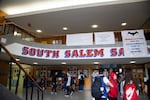
Students walk the halls of South Salem High School in Salem, Ore., Tuesday, Sept. 17, 2019.
Elizabeth Miller / OPB
“I play smooth jazz in here so it’s not awkward when the kids come in, or a dead silence,” Roberson said.
As Roberson sits down with juniors and seniors, he’s excited to hear about their summer — and animated when talking football. Both he and Ramirez coach high school teams.
Even though the two of them can be tough, Roberson said he and Ramirez are also there to be supportive.
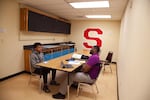
Dwight Roberson talks with El, a junior, at South Salem High School in Salem, Ore., Tuesday, Sept. 17, 2019. Community resource specialists like Roberson help student groups achieve academic success with one-on-one support.
Elizabeth Miller / OPB
“Look at me as someone here to help, that’s all I’m trying to do,” Roberson said. “Yeah, I’m going to be annoying — and I let them know, I might be annoying to you. But at the end of the day, it’s for the best.”
And students respond. Roberson reads a letter he recently received from a Sprague High student.
“Thank you for believing in me when no one else did, also being here with me through every step of the way,” Roberson said, reading the letter.
The support is aimed at more than making sure kids are getting to class.
Ramirez is starting up a program for high school Islander students to mentor younger students. Roberson started black student unions at all of the district’s high schools.
South Salem High School junior El said Roberson is one of the only people he can talk to about race besides his dad.
“Issues that I have aren’t always going to be academic, so having somebody I can talk to here is just a good opportunity,” El said.
Changing Generations
When Ramirez and Roberson talk about their jobs, it’s about changing behavior and relationships for future Salem-Keizer students.
“We’re doing so much more to help change generations coming up,” Ramirez said.
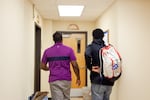
Dwight Roberson, left, walks with Emorej, a senior, at South Salem High School in Salem, Ore., Tuesday, Sept. 17, 2019. Community resource specialists like Roberson help student groups achieve academic success with one-on-one support.
Elizabeth Miller / OPB
And helping students is about understanding young people’s lives at home and around the neighborhood.
“Sometimes when we’re at school, we think a kid is acting bad just because of that, or a kid's not coming to school just to not come to school,” Roberson said. “But what we find out is there’s more to it.”
The district is also trying to increase family engagement with targeted efforts to groups, including Pacific Islander families. At a recent meeting at North Salem High, Ramirez was part of a meeting between school staff and local Pacific Islanders aimed at helping the school learn from the community.

Ken Ramirez takes notes while talking to Carly, a senior, at North Salem High School in Salem, Ore., Tuesday, Sept. 17, 2019. Community resource specialists like Ramirez help student groups achieve academic success with one-on-one support.
Elizabeth Miller / OPB
With increased communication between families and the district, Ramirez expects to see family members asking for his help, not just students.
“We have to make sure the parents know all the resources that are available and that we can connect them with,” Ramirez said.
For Roberson, it's usually teachers or parents who reach out to him for help.
There’s a lot of work still to do, when it comes to students, though. Both groups are considered to be chronically absent at almost every high school, meaning they're missing at least 10% of the school year.
But soon it won’t be just two guys doing this work alone. The district plans to hire outreach specialists at the middle school level for both student groups.

